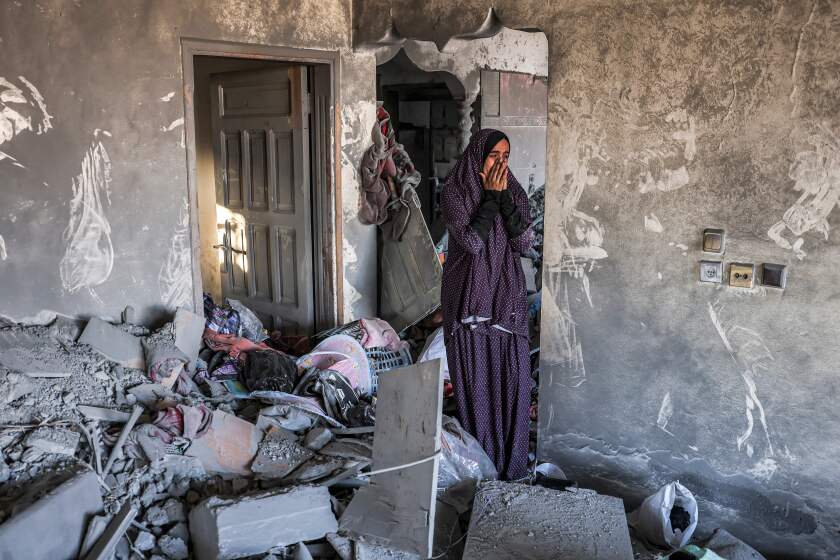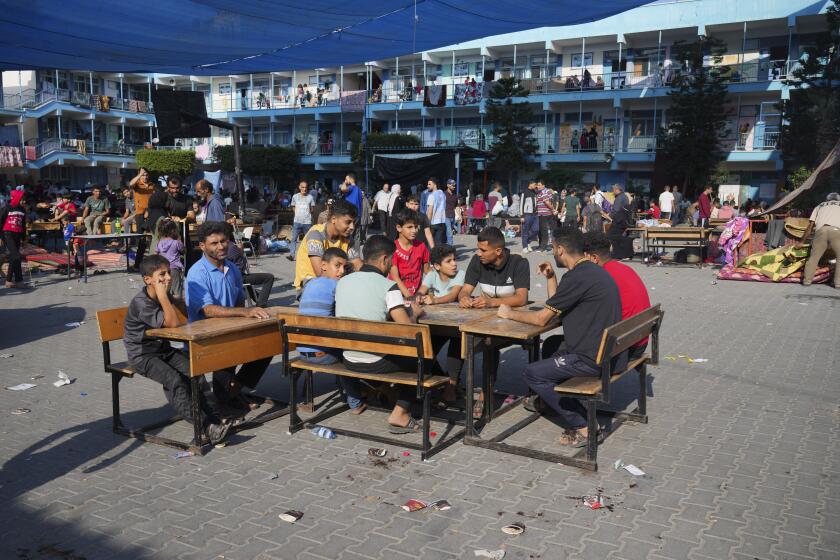Opinion: How the International Court of Justice can hold Israel accountable in Gaza

- Share via
Israel’s military operations against Hamas in Gaza have resulted in an extraordinary number of civilian casualties by any standards, especially the killing of children and the displacement of hundreds of thousands of people, many of whose homes have been totally destroyed. Even the Biden administration, Israel’s staunchest ally in this war since Hamas’ attack on Israel on Oct. 7, has sometimes referred to “indiscriminate bombing” and expressed dissatisfaction with Israel’s efforts to avoid civilian casualties and abide by international humanitarian law.
South Africa filed a case in the International Court of Justice, bringing charges of “genocide” against Israel, which represents a major escalation in allegations concerning the inhumanity with which Israel is waging war in Gaza. This week, South Africa lawyers presented their claims, while Israel attempted to rebut the accusations, raising questions about the foundations of international law and its application in wartime.
Israeli leaders have achieved their expansionist goals in the West Bank by carrying out widely abhorred policies illegal under international law. They are doing that again in the destruction of Gaza.
Under the United Nations genocide convention, genocide is defined as intent to destroy, in whole or in part, a national, ethnic, racial or religious group, not only through killing but also by other measures such as “deliberately inflicting on the group conditions of life calculated to bring about its physical destruction in whole or in part.”
Recently, the ICJ has been active in issuing emergency injunctions, called provisional measures, in situations where parties have invoked the genocide convention, most recently by The Gambia against Myanmar for its actions against the Rohingya people. That means the state would have to stop certain actions until the court makes its final ruling. Ultimately, these orders would only be formally enforceable by the U.N. Security Council. But the injunctions could influence individual states to take their own actions, such as sanctions against a nation that fails to comply.
Imagining possible futures beyond Israel’s Jewish supremacy is a political act for me, rooted in my people’s history.
South Africa is able to bring this case because the genocide convention allows standing before the ICJ of any state that is a party to the convention, regardless of whether it is particularly affected (obviously South Africa is not a direct party to the conflict in Gaza).
Underpinning South Africa’s case are numerous statements by Israel’s leaders. That includes Prime Minister Benjamin Netanyahu, President Isaac Herzog, Defense Minister Yoav Gallant and many other elected politicians, who explicitly call for total destruction or elimination of Gaza. Often these statements are couched or surrounded by language that allows some deniability, referring (in plain contradiction) to the need to spare civilian lives. In its oral argument before the court Thursday, South Africa also presented videos of Israel Defense Forces soldiers in the field chanting some of the leaders’ genocidal slogans and celebrating what appeared to be acts of indiscriminate destruction.
With 20,000 dead in Israel’s bombing of Gaza, we feel compelled to prove our humanity. We have been denied agency as a people.
An additional part of South Africa’s case addresses the starvation and disease resulting from Israel’s siege of Gaza and obstruction or disruption of food, clean water supply, electricity and medical supplies and facilities. Luis Moreno Ocampo, the founding chief prosecutor of the International Criminal Court, which is separate from the ICJ, said in an interview that this in itself qualifies as plausibly genocide.
Not surprisingly Israel has reacted with rage to accusations of genocide, a category of crime that was invented in the wake of the Holocaust to put a specific legal meaning to the ultimate form of atrocity: complete extermination of a people, or the attempt thereof. Israel argues that regrettable civilian losses — from dealing with a ruthless enemy that uses even children as human shields, embedding fighters in schools and hospitals — are not comparable to genocide.
After the Holocaust, Germany committed to standing against mass violence. Why are authorities now arresting Jews protesting Israel’s bombardment in Gaza and canceling events with Palestinians?
But the genocide convention is concerned above all with prevention, and thus should be applied long before a situation metastasizes into full-blown and possibly unstoppable annihilation. Indeed, one of the fundamental aims of provisional measures in international law is the avoidance of irreparable harm. The convention states in its preamble that “at all periods of history genocide has inflicted great losses on humanity”; this makes clear that the Holocaust is not the only form or model that a genocide can take.
In its oral argument Friday, Israel engaged in a sweeping denial that it had ever strayed from the letter of humanitarian law in the Gaza conflict. Some of its representatives actually suggested the state may have gone beyond what is required in humanitarian precautions, such as by giving warnings to civilians before bombings.
Notably absent, though, was any direct refutation of the specific events identified by South Africa in its pleadings, such as summary executions of entire families including children, and sniping on fleeing civilians. Unrefuted, these incidents, along with the genocidal statements of Israeli political and military leaders as well as troops in the field, provide more than enough plausibility to the claim of genocide, which is the standard of proof the court requires for an order of provisional measures.
This said, Israel’s opening counsel, Tal Becker, made a strong point in court that one of South Africa’s requests — an immediate cessation to hostilities — ignores the imminent and ongoing threat by Hamas, which Israel has a legitimate interest in continuing to counter with military means.
It may take the court a year or two to decide the whole case. But for its credibility and to have the best chance of compliance, the court should order the provisional measures as a kind of suspended sentence, delaying their binding effect for a reasonable period of time.
This would allow Israel a chance to scale back its operations; walk back unambiguously the genocidal statements of its leaders; and take other effective measures to halt the genocidal cancer that has started to grow within a necessary military operation against an enemy that has terrorized Palestinians and Israeli Jews alike.
Rob Howse is a professor of international law at NYU School of Law. A former Canadian diplomat, he served on the Policy Planning Secretariat of Canada’s foreign ministry and on its delegation to the U.N. General Assembly. In 1994, he participated with South African academics and politicians in a drafting committee that produced the design of South Africa’s Truth and Reconciliation. He has also provided advice to South Africa’s government, on a pro bono basis, on unrelated matters.
More to Read
A cure for the common opinion
Get thought-provoking perspectives with our weekly newsletter.
You may occasionally receive promotional content from the Los Angeles Times.














